|
|
|
Sort Order |
|
|
|
Items / Page
|
|
|
|
|
|
|
| Srl | Item |
| 1 |
ID:
100908
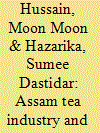

|
|
|
| 2 |
ID:
118422
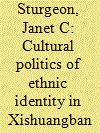

|
|
|
| 3 |
ID:
176488
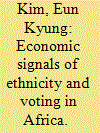

|
|
|
|
|
| Summary/Abstract |
The existing literature has demonstrated that both ethnic and economic factors affect a vote decision in African democracies. I show that there is a meaningful interaction between the two cleavages in their influence on voting. In particular, I argue for political salience of agricultural subsectors that shape the electoral consequences of economic performance in the context where agricultural policy affects the livelihood of the majority population. Relying on the analyses of the 2007 and 2013 elections in Kenya, I illustrate how likely an individual, who is attached to a politically coherent ethnic group, votes for a candidate, the majority of whose ethnic members engage in the same industry as the voter himself regardless of the candidate's ethnicity. The results show that the sector factor reinforces the positive and negative effects of ethnic communities on incumbent support, and also explains voting by ethnic minorities whose motives for voting are not ethnic.
|
|
|
|
|
|
|
|
|
|
|
|
|
|
|
|
| 4 |
ID:
112718


|
|
|
|
|
| Publication |
2012.
|
| Summary/Abstract |
There have been growing concerns about the effects of food safety standards on agricultural trade throughout the world. The objective of this paper is to assess the impacts of food safety standards on tea exports from China, the world's largest tea producer and exporter. To achieve this objective, the paper discusses the trends and nature of China's tea production and export, analyzes changes on tea safety standards indicated by Sanitary and Phytosanitary (SPS) measures, Maximum Residual Limit (MRL) of pesticides and the coverage of tea safety standards concerning regulatory pesticides in major importing countries, and quantitatively estimates the impacts of food safety standards on China's tea export based on a gravity model. The results show that the MRL of pesticides (e.g., endosulfan, fenvalerate and flucythrinate) imposed by importing countries have significantly affected China's tea exports. The results also show that China's tea exports have been significantly restricted when importing countries increase coverage of tea safety standards concerning regulatory pesticides.
|
|
|
|
|
|
|
|
|
|
|
|
|
|
|
|
| 5 |
ID:
088118


|
|
|
|
|
| Publication |
2009.
|
| Summary/Abstract |
The focus of this paper is the eighteenth and nineteenth century popular discourse on women's tea practice in guides for women's edification. It argues that in these commercially produced texts we find evidence of the dissemination of information on tea culture to a new social group, namely, wealthy commoner women. Thus, we see that with economic growth came new opportunities for commoner women to participate in cultural practices associated with the elite. Tea was a particularly significant cultural practice as it taught women etiquette and manners. Through learning tea, commoner women could learn to comport themselves in a manner associated with those of higher status. It was a way of displaying their, and their family's, accumulation of capital, both social and economic, and also a way to potentially raise their status through marriage. This early modern discourse on women's tea laid the foundations for the growth of women's tea in modern Japan, a development made possible by the flexibility of the status system as it affected women
|
|
|
|
|
|
|
|
|
|
|
|
|
|
|
|
| 6 |
ID:
076461
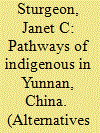

|
|
|
| 7 |
ID:
084227
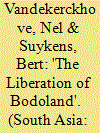

|
|
|
|
|
| Publication |
2008.
|
| Summary/Abstract |
Bodoland, located in western Assam, has been a theatre for insurgencies since the mid 1980s. Too often, migration has been the paradigmatic framework to analyse not only this, but most conflicts, raging in Assam. In this article we argue that migration in itself is insufficient to understand the problems in Bodoland. Instead, we focus on forestry and tea estates, and contend that they, forming important restrictive structures, caused tribal entrapment, finally leading to violence. Moreover, we claim that during the conflict a shift in control over these structures occurred, changing the livelihood arithmetic of the involved communities. Finally, we discuss both the restraints and opportunities of the BTC/BTAD (Bodoland Territorial Council/Bodoland Territorial Administrative District)-the result of the peace process-and warn that the escape from entrapment for the Bodo could lead to the entrapment of other communities in the area.
|
|
|
|
|
|
|
|
|
|
|
|
|
|
|
|
|
|
|
|
|